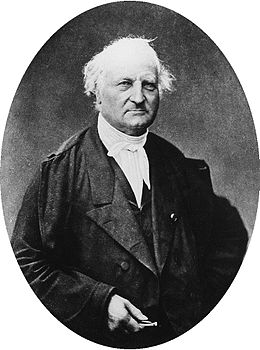Antoine Jérôme Balard
| Antoine Jérôme Balard | |
|---|---|

Antoine Jérôme Balard in the 1870s
|
|
| Born |
30 September 1802 Montpellier |
| Died | 30 April 1876 (aged 73) Paris |
| Nationality | French |
| Fields | chemistry |
| Known for | discovery of bromine |
| Influenced | M.P.E. Berthelot |
| Notable awards | Royal Medal (1830) |
Antoine Jérôme Balard (30 September 1802 – 30 April 1876) was a French chemist and one of the discoverers of bromine.
Born at Montpellier, he started as an apothecary, but taking up teaching he acted as chemical assistant at the faculty of sciences of his native town, and then became professor of chemistry at the royal college and school of pharmacy and at the faculty of sciences. In 1826 he discovered in seawater a substance which he recognized as a previously unknown element and named it bromine. It had been independently prepared by Carl Jacob Löwig the previous year and the two are both regarded as having discovered the element.
This achievement brought him the reputation that secured his election as successor to Louis Jacques Thénard in the chair of chemistry at the faculty of sciences in Paris, and in 1851 he was appointed professor of chemistry at the College de France, where he had M.P.E. Berthelot first as pupil, then as assistant and finally as colleague. Balard also had Louis Pasteur as a pupil when Pasteur was only 26 years old. It was in Balard's laboratory that Pasteur discovered the difference between "right-handed" and "left-handed" crystals while he was working with tartaric acid. Balard died in Paris in 1876.
While the discovery of bromine and the preparation of many of its compounds was his most conspicuous piece of work, Balard was an industrious chemist on both the pure and applied sides. In his researches on the bleaching compounds of chlorine he was the first to advance the view that bleaching-powder is a double compound of calcium chloride and hypochlorite; and he devoted much time to the problem of economically obtaining soda and potash from seawater, though here his efforts were nullified by the discovery of the much richer sources of supply afforded by the Stassfurt deposits. In organic chemistry he published papers on the decomposition of ammonium oxalate, with formation of oxamic acid, on amyl alcohol, on the cyanides, and on the difference in constitution between ethyl nitrate and ethyl sulfate. He also helped Louis Pasteur devise the experiment that would prove spontaneous generation to be false.
...
Wikipedia
